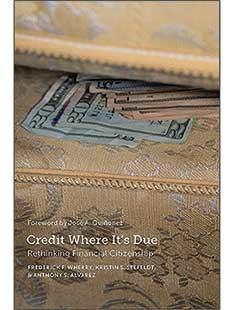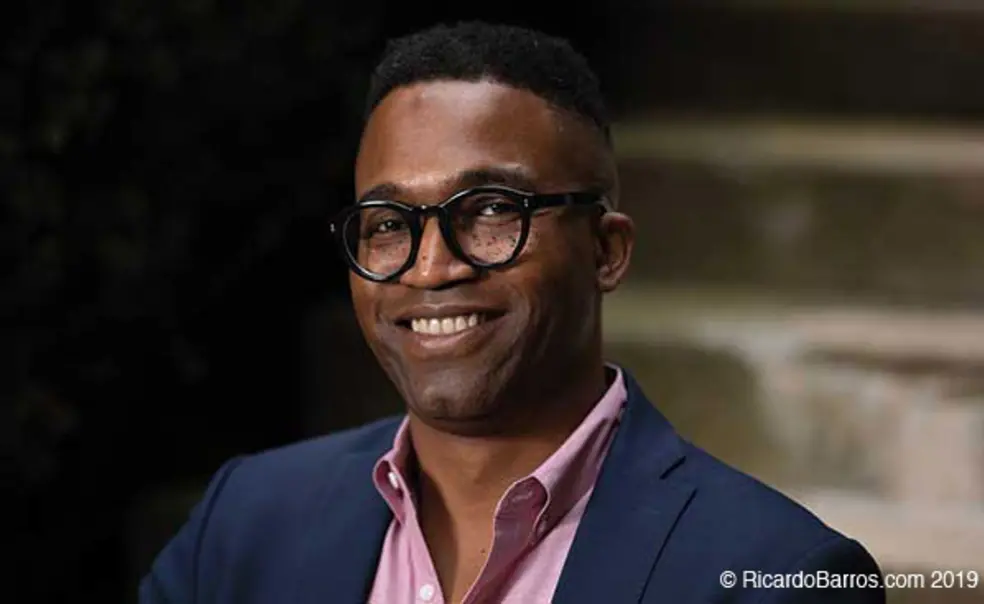Faculty Book: Frederick Wherry *04 on Extending Credit
How one professor is working to balance the social ledger of creditworthiness
For many borrowers, obtaining a home mortgage, car loan, or credit card is a relatively simple process. A bank looks up their credit score — measured on a scale of 300 to 850 — to determine their past financial behavior. For some 45 million Americans, however, that assessment is not possible. According to sociology professor Frederick Wherry *04, those with no credit score — “credit-invisible” or “credit-unscorable”— or with little-to-bad credit tend to be young adults, immigrants, and people of color, who comprise more than 10 percent of the adult population.

Whether it’s a lack of a credit history or a preference for cash, these Americans are locked out of “financial citizenship,” says Wherry. His research is almost entirely devoted to the idea of financial citizenship. In a recent book, Credit Where It’s Due: Rethinking Financial Citizenship (Russell Sage Foundation), co-written with Kristin Seefeldt, José Quiñonez *98, and Anthony Alvarez, he examines the systemic roots of credit invisibility, the pitfalls of having no credit or bad credit, and solutions to reverse the trends. Wherry began examining these issues as a Ph.D. student, along with the legacies that have led to disparities in wealth — including redlining in housing and discrimination in banking and lending. Such policies have led to a stark wealth divide. In 2016, the median black household wealth (net assets minus debt) was $3,500 — just 2.4 percent of that of white households (which was $147,000).
“It’s really hard to talk about asset-building in communities of color when people don’t even have credit scores,” Wherry says, noting that 28 percent of blacks and Latinos are credit-invisible. That void can cause consumers to take on forms of credit that are ultimately more expensive — including subprime mortgages, check-cashing stores, and payday lenders — which only perpetuates inequality.
The effects of bad or no credit are far-reaching: Landlords can require a higher security deposit from the credit-invisible. Employers increasingly are checking job applicants’ credit, resulting in lower starting wages or a significant handicap at promotion time if the report is unfavorable, Wherry says. In addition, such practices can exacerbate existing cleavages in society. One study, co-written with Rourke O’Brien *14, found that applicants with “black-sounding” names and bad credit were likely to be hired at a lower salary than whites with the same credit score, while women with low credit scores were less likely to be hired at all.
“It’s really hard to talk about asset-building in communities of color when people don’t even have credit scores.”
— Sociology professor Frederick Wherry
In poorer households, financial worries due to a lack of credit can manifest in unhealthy ways and lead to anxiety and depression. Wherry has spearheaded extensive studies of public databases to better understand these effects in his role as director of the Dignity + Debt Network, a collaboration between Princeton University and the Social Science Research Council. One project done in coordination with Princeton graduate students used machine learning to analyze complaints to the Consumer Financial Protection Bureau. Borrowers lodged an overwhelming number of complaints about humiliating and abusive harangues from debt collectors, who would sometimes call them repeatedly at work and occasionally even called their bosses, increasing feelings of worthlessness as well as threatening their employment. Wherry and his colleagues were surprised by just how much consumers wanted to work with lenders and demonstrate their honorable intentions and just how wounding such tactics could be.
Credit Where It’s Due explores how to reverse this trend. Much of the book focuses on the Mission Asset Fund, an innovative program in San Francisco headed by Quiñonez (see “Credit Builder,” PAW, March 21, 2018) that works with the neighborhood’s Latino community to establish formal lending circles that allow community members to lend money to one another with zero interest, and then report repayment to credit bureaus. Another program sets up loans to start small businesses. Informal lending circles were already common, but the fund ensures members access to formal credit lines in the future. “It’s not so much about changing behavior,” Wherry says, “but about making those behaviors structured and visible.”
But larger policy changes may be needed. “We must recognize that conscious policy choices are responsible for our existing inequalities,” Wherry and his colleagues write, “and that it will take clearly intentioned policies to undo their impact.” One idea they support concerns “baby bonds”: a government-funded trust for each child that would mature at age 18, to be used for education, to buy a home, or start a business. The initial amount of the bond would be inversely proportional to the wealth of the baby’s family. (The policy might be better called “seed capital for every child,” they argue.) Wherry and his co-writers also propose government-backed short-term loans as an alternative to payday lenders.
Such programs would help the credit-invisible by allowing them access to capital at fair rates, and acknowledging that just because someone doesn’t have a credit score, doesn’t mean they are financially irresponsible. “When someone is struggling financially, the default assumption is there must be something wrong with them — either they are shirking their responsibilities, made a mistake, or somehow got duped,” Wherry says. Changing that perception could be the first step in bringing them out of the shadows and making them viable financial citizens.












No responses yet